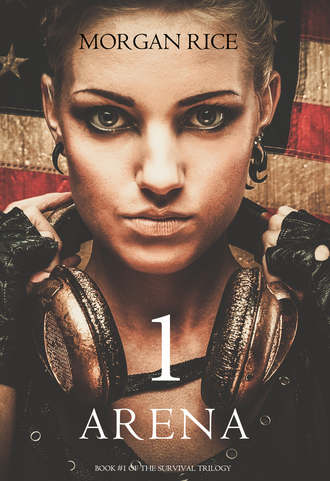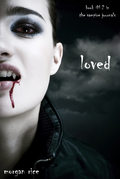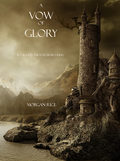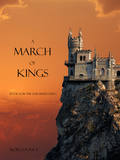
Морган Райс
Arena One: Slaverunners
“What’s wrong?” Logan asks.
I’ve stopped. I’m standing there, staring. I lower my head, grab his shoulder, and continue on.
“Nothing,” I respond.
We continue into the heart of the shopping district of the South Street Seaport. I remember sitting here, looking at the shining cobblestone, at all the expensive shops, feeling as if I were in the most pristine place in the world. A place impervious to change. Now I see nothing but devastation. There aren’t even any signs, any markers to indicate what it once was.
We turn left on Fulton and in the distance I spot the waterfront. It is twilight now, thick gray clouds gathering on the horizon, and I finally feel a surge of hope as I see the water, just blocks away. The bus tracks turn down this road, coming to an end at the pier. We have made it.
We walk faster and I feel a surge of adrenaline as I wonder if Bree could still be there, on the pier. I subconsciously check my belt for weapons before remembering I have none left. No matter. If she’s there, I will find a way to get her back.
We walk out onto the wooden pier of the Seaport, once teeming with tourists, now desolate. The tall, historic sailing ships are still there, bobbing in the water – but now they’re just rotting hulls. At the end of the pier I see the bus. I hurry towards it, my heart pounding, hoping Bree is somehow still on it.
But of course the bus has been unloaded long ago. I reach the side of the bus and find it empty. I check the snow and see the tracks where the girls were unloaded, led down a ramp to a boat. I look out at the water, and in the distance, I spot a large, rusted barge, maybe half a mile off, docked on Governor’s Island. A line of girls is being unloaded. Bree is among them. I can feel it.
I feel a surge of determination. But also of hopelessness. We have missed the boat. We’re too late.
“There’s another boat in the morning,” Logan says. “At dawn. There always is, once a day. We just need to wait it out. Find shelter for the night.”
“If you make it through the night,” comes a strange voice from behind us.
We spin around.
Standing there, about ten feet away, is a group of about a dozen people, dressed in yellow military fatigues. In their center stands a person who looks like their leader. His face is melted, distorted, as are the faces of the others. He looks even worse than the Biovictims, if that’s possible. Maybe it’s from living in this radiated zone.
Somehow, they have managed to creep up on us. We are outnumbered, no match for the weapons in their belts, the guns in their hands. We have no chance.
“You’re in our territory now,” he continues. “Why shouldn’t we kill you ourselves?”
“Please,” I plead. “The slaverunners took my sister. I have to get her back.”
“We don’t like slaverunners any more than you do. They ride their buses through here like it’s their territory. IT’S MY TERRITORY!” he shrieks, his face distorted, his eyes bulging. “DO YOU HEAR ME? IT’S MINE!”
I flinch at the sound of his voice, so distorted with rage. I am delirious with exhaustion, with pain, and can hardly even stand.
He takes a step toward us, and I brace myself for an attack. But before I can even finish the thought, my world starts to spin. It spins, again and again, and before I know it, I am falling.
And then, everything is black.
Twenty Nine
I open my eyes with effort. I’m not sure if I’m dead or alive, but if I’m alive, I didn’t know life could feel this way: every muscle in my body is on fire. I am shaking and shivering and have never been so cold my life – yet at the same time I am also burning up, a cold sweat running down the back of my neck. My hair clings to the side of my face, and every joint in my body hurts more than I can describe. It is like the worst fever I’ve ever had – times a hundred.
The epicenter of pain is my calf: it throbs and feels like the size of a softball. The pain is so intense that I squint my eyes, clench my jaw, and pray silently that someone would just cut it off.
I look around and see I’m lying on a cement floor, on the upper story of an abandoned warehouse. The wall is lined with large factory windows, most of the glass panes shattered. Intermittent breezes of cold air rush in, along with gusts of snow, the flakes landing right in the room. Through the windows I can see the midnight sky, a full moon hanging low, amidst the clouds. It is the most beautiful moon I’ve ever seen, filling the warehouse with ambient light.
I feel a gentle hand on my shoulder.
I lift my chin and manage to turn it just a bit. There, kneeling by my side, is Logan. He smiles down. I can’t imagine how bad I must look, and I’m embarrassed for him to see me like this.
“You’re alive,” he says, and I can hear the relief in his voice.
I think back, trying hard to remember where I last was. I remember the Seaport…the pier… I feel another wave of pain run up my leg, and a part of me wishes that Logan would just let me die. He holds up a needle, prepping it.
“They gave us medicine,” he says. “They want you to live. They don’t like the slaverunners any more than we do.”
I try to register what he’s saying, but my mind is not working clearly, and I shiver so much, my teeth are chattering.
“It’s Penicillin. I don’t know if it will work – or if it’s even the real thing. But we have to try.”
He doesn’t have to tell me. I can feel the pain spreading and know there is no alternative.
He holds my hand, and I squeeze his. He then leans over and lowers the needle right to my calf. A second later, I feel the sharp sting of the needle entering my flesh. I breathe sharply and squeeze his hand harder.
As Logan pushes the needle in deeper, I feel the burning liquid enter. The pain is beyond what I can take, and despite myself, I hear my shriek echoing in the warehouse.
As Logan removes the needle, I feel another cold gust of wind and snow, cooling the sweat on my forehead. I try to breathe again. I want to look up at him, to thank him. But I can’t help it: my eyes, so heavy, close on themselves.
And a moment later, I am out again.
* * *
It is summer. I am thirteen years old, Bree is six, and we skip hand-in-hand through the lively streets of the Seaport. They are jam-packed with life, everyone out and about, and Bree and I run down the cobblestone streets, laughing at all the funny people.
Bree plays a sort of hopscotch game on the cracks, half-hopping and half-skipping every few steps, and I try to follow in her path. She laughs hysterically at this, and then laughs even harder as I chase her around and around a statue.
Behind us, smiling, hand-in-hand, are my parents. It is one the few times I can remember them being happy together. It is also one of the few times I can remember my father actually being around. They trail behind us, watching over us, and I’ve never felt so safe in my life. The world is perfect. We will always be as happy as this moment.
Bree finds a seesaw and she’s ecstatic, beelining for it and jumping on. She doesn’t hesitate, knowing I will jump on the other side and even her out. Of course I do. She is lighter than me, and I make sure not to jump too hard, so that she can balance with me.
I blink. Time has passed, I’m not sure how much. We’re now at a waterfront park somewhere. Our parents are gone, and we are alone. It is sunset.
“Push me harder, Brooke!” Bree squeals.
Bree is seated on a swing. I reach over and push her. She goes higher and higher, laughing hysterically.
Finally, she jumps off. She comes around and hugs me, wrapping her little hands tight around my thighs. I kneel down and give her a proper hug.
She leans back and looks at me, smiling.
“I love you, Brooke,” she says, smiling.
“I love you too,” I answer.
“Will you always be my big sister?” she asks.
“I will,” I say.
“Do you promise?” she asks.
“I promise,” I say.
* * *
I open my eyes, and for the first time in as long as I can remember, I am out of pain. It is amazing: I feel healthy again. The pain in my leg is mostly gone, the swelling shrunk down to the size of a golf ball. The medicine really worked.
My aches and pains have also reduced dramatically, and I sense that my fever has, too. I don’t feel nearly as cold, and I’m not sweating as much. I’ve been given a second chance at life.
It is still dark. I can no longer see the moon and wonder how much time has passed. Logan is still sitting there, by my side. He sees me and reacts immediately, reaching over and brushing my forehead with a damp cloth. He’s not wearing a coat; he has draped it over me. I feel terrible; he must be freezing.
I feel a fresh wave of appreciation for him, feel closer to him than ever. He must really care for me. I wish I could tell him how much I appreciate it. But right now, my mind is still moving slow, and doesn’t seem able to form the words.
He reaches down and puts a hand behind my head and lifts it.
“Open your mouth,” he says softly.
He places three pills on my tongue, then pours bottled water into my mouth. My throat is so dry that it takes a few tries to swallow – but finally, I feel it go down. I lift my head a bit more and take another long sip.
“Fever reducers,” he says.
“I feel much better,” I say, with new energy. I grab his hand and squeeze it tight in appreciation. He has saved my life. Again. I look up at him. “Thank you,” I say earnestly.
He smiles, then suddenly pulls his hand away. I’m not sure how to interpret this. Does he not care for me as much as I think? Did he only do this out of obligation? Does he care for someone else? Did I overstep my boundaries in some way? Or is he just shy? Embarrassed?
I wonder why it bothers me so much, and suddenly it dawns on me: I have feelings for him.
He reaches down and removes something from a backpack.
“They gave us this,” he says.
He pulls out a piece of dried fruit and hands it to me. I take it in awe, feeling a hunger pang already.
“What about you?” I ask.
He shakes his head, as if deferring. But I won’t eat it otherwise. I tear mine in half and shove it into his hand. He grudgingly accepts it. I then devour mine, and it is quite possibly the best thing I’ve ever eaten. It tastes like cherries.
He smiles as he eats, then reaches into the pack and pulls out two pistols. He hands me one. I study it in awe.
“Fully loaded,” he says.
“They must really hate those slaverunners,” I say.
“They want us to get your sister. And they want us to inflict damage,” he says.
The gun is heavy in my hand; it feels so good to have a weapon again. Finally, I don’t feel defenseless. I have a fighting chance to get her back.
“Next boat leaves at dawn,” he says. “A few hours to go. You up for it?”
“I’ll be on that boat even if I’m a corpse,” I say, and he smiles.
He examines his own gun, and I am suddenly overcome with a desire to know more about him. I don’t want to pry, but he is so silent, so enigmatic. And I am feeling more and more attached to him. I want to know more.
“Where were you going to go?” I ask him. My voice is hoarse, my throat dry, and it comes out more scratchy than I would like.
He looks at me, puzzled.
“If you’d escaped, in the beginning. If you’d taken that boat.”
He looks away and sighs. A long silence follows, and after a while, I wonder if he is going to answer.
“Anywhere,” he finally says, “far away from here.”
He’s holding something back. I’m not sure why. But I just feel he’s the type to have a more concrete plan.
“There must be somewhere,” I say. “Some place you had in mind.”
He looks away. Then, after a long silence, reluctantly, he says, “Yes, there was.”
It is clear from his tone that he doesn’t expect to be able to reach it now. After a long pause, I realize he’s not going to volunteer it. I don’t want to pry, but I have to know.
“Where?” I ask.
He looks away, and I can see he doesn’t want to tell me for some reason. I wonder if maybe he still doesn’t trust me. Then, finally, he speaks.
“There’s supposed to be one town left. A safe place, untouched, where everything is perfect. Unlimited food and water. People live there as if there was never a war. Everyone’s healthy. And it’s safe from the world.”
He looks at me.
“That’s where I was going.”
For a moment I wonder if he’s pulling my leg. He must realize that it sounds incredulous – infantile, even. I can’t believe that someone as mature and responsible as him would believe in such a place – or would make a plan to find it, no less.
“Sounds like a place of fairy tales,” I say, smiling, half-expecting him to tell me he was just kidding.
But to my surprise, he suddenly scowls down at me.
“I knew I shouldn’t have said anything,” he says, sounding hurt.
I am shocked by his reaction. He really does believe it.
“I’m sorry,” I say. “I thought you were joking.”
He looks away, embarrassed. It’s hard for me to even comprehend it: I gave up thinking of anything good still existing in the world long ago. I can’t believe he still clings to this belief. Him, of all people.
“Where is it?” I finally ask. “This town?”
He pauses for a long time, as if debating whether to tell me.
Finally, he says: “It’s in Canada.”
I am speechless.
“I was going to take the boat all the way up the Hudson. Find out for myself.”
I shake my head. “Well, I guess we all have to believe in something,” I say.
The second I say it, I regret it. It comes out too harshly. That’s always been my problem – I never seem able to say the right things. I can be too tough, too critical – just like Dad. When I get nervous, or embarrassed, or afraid to say what I really mean – especially around boys – sometimes it just comes out wrong. What I meant to say was: I think it’s great that you still believe in something. I wish I did, too.
His eyes darken, and his cheeks flush with embarrassment. I want to retract it, but it’s too late. The damage is done. I’ve screwed things up already.
I try to quickly think of something, anything, to change the subject. I’m not good at conversation. I never have been. And it might be too late to salvage it anyway.
“Did you lose anyone?” I ask. “In the war?”
I am such an idiot. What a stupid question. I’ve just gone from bad to worse.
He breathes deeply, slowly, and I feel as if now I’ve really hurt him. He bites his lower lip, and for a moment, it looks like he’s holding back tears.
After an interminable silence, he finally says: “Everyone.”
If I wake up in the morning and he’s gone, I won’t blame him. In fact, I’d be surprised if he sticks around. Clearly, I should just shut up and wait for dawn.
But there’s one more thing I need to know, one thing that’s burning inside. And I just can’t stop myself from mouthing the words:
“Why did you save me?” I ask.
He looks at me with intensity, through red eyes, then slowly looks away. He turns, and I wonder if he’s going to respond at all.
A long silence follows. The wind whistles through the empty windows, the snowflakes land on the floor. My eyes grow heavy and I’m beginning to fall back asleep, drifting in and out of consciousness. And the last thing I hear, before my eyes close for good, are his words. They are so faint and soft that I’m not even sure if he really says it, or if I just dream it:
“Because you remind me of someone.”
* * *
I fall in and out of sleep for the next few hours, partly dreaming and partly flashing back. During one of my episodes, I finally remember what happened on that day we left the city. As much as I’d like to forget, it all comes flooding back to me.
When I found Bree in that alley, surrounded by those boys, and threw the Molotov cocktail – there was a small explosion, and then shrieks filled the air. I managed to hit their ringleader, and the boy lit up in a ball of fire. He ran about, frantic, as the others tried to put him out.
I didn’t wait. In the chaos, I ran right past the flaming boy and right for Bree. I grabbed her hand and we ran away from them, through the back alleys. They chased us, but we knew those back streets better than anyone. We cut through buildings, in and out of hidden doors, over dumpsters, through fences. Within a few blocks, we’d thoroughly lost them and made it back to the safety of our apartment building.
It was the last straw. I was determined to leave the city right then and there. It was no longer safe – and if Mom couldn’t see that, then we’d have to leave without her.
We burst into our apartment, and I ran straight to Mom’s room. She was sitting there, in her favorite chair, staring out the window, as she always did, waiting for Dad to return.
“We’re leaving,” I said, determined. “It’s too dangerous here now. Bree was almost killed. Look at her. She’s hysterical.”
Mom looked at Bree, then back to me, not saying a word.
“He’s not coming back,” I said. “Face it. He’s dead.”
Mom reached back and smacked me. I was stunned. I still remember the sting of it.
“Don’t you ever say that,” she snapped.
I narrowed my eyes, furious that she’d dare hit me. It is a hit I will never forgive her for.
“Fine,” I seethed back to her. “You can live in your fantasy as long as you like. If you don’t want to come, you don’t have to. But we’re leaving. I’m heading to the mountains, and I’m taking Bree.”
She snorted back derisively. “That’s ridiculous. The bridges are blocked.”
“I’ll take a boat,” I answer, prepared. “I know someone who will take us. He’s got a speedboat and he’ll take us up the Hudson.”
“And how can you afford that?” she asked me coldly.
I hesitated, feeling guilty. “I traded my gold watch.”
She narrowed her eyes at me. “You mean Dad’s gold watch,” she snapped.
“He gave it to me,” I corrected. “And I’m sure he’d want to see me put it to good use.”
She looked away from me in disgust, staring back out the window.
“Don’t you get it?” I continued. “In a few more weeks, this city will be destroyed. It’s not safe here anymore. This is our last chance to get out.”
“And how’s your father going to feel when he comes home and finds us all gone? When he discovers that we have all abandoned him?”
I stared at Mom, incredulous. She was really lost in her fantasy.
“He left us,” I spat. “He volunteered for this stupid war. No one asked him to go. He’s not coming back. And this is exactly what he’d want us to do. He’d want us to survive. Not sit around some stupid apartment waiting to die.”
Mom slowly turned and looked at me with her cold, steely-gray eyes. She had that awful determination, the same awful determination I have. Sometimes I hate myself for being so much like her. I could see in her eyes, at that moment, that she would never, ever, give in. She had gotten it into her head that waiting was the loyal thing to do. And once she got something into her head, there was no changing it.
But in my view, her loyalty was misplaced. She owed it to us. To her children. Not to a man who was more devoted to fighting than to his family.
“If you want to leave your father, go ahead. I’m not going. When your plans fall through and you don’t make it upriver, you can come back. I’ll be here.”
I didn’t wait a second longer. I grabbed Bree by the hand, turned and strutted with her to the door. Bree was crying, and I knew I had to get out of there quick. I stopped one last time before the door.
“You’re making a mistake,” I called out.
But she didn’t even bother to turn, to say goodbye. And I knew she never would.
I opened the door, then slammed it behind me.
And that was the last I ever saw Mom alive again.
Thirty
I wake to blinding sunlight. It is as if the world is alive again. Sunlight streams in through the windows all around me, brighter than I’ve ever seen, bouncing off of everything. The wind has stopped. The storm is over. Snow melts off the window ledge, the sound of dripping water echoing all around me. There is a cracking noise, and a huge icicle crashes down onto the floor.
I look around, disoriented, and realize I’m still lying in the same place as last night, Logan’s coat still draped over me. I feel completely rejuvenated.
Suddenly, I remember, and sit up with a shock. Dawn. We had to get up at dawn. The sight of the bright morning light terrifies me, as I look over and see Logan lying there, right beside me, eyes closed. He is fast asleep. My heart stops. We have overslept.
I scramble to my feet, feeling energetic for the first time, and roughly shake his shoulder.
“LOGAN!” I say urgently.
Immediately, his eyes open and he jumps to his feet. He looks around, alert.
“It’s morning!” I plead. “The boat. We’re going to miss it!”
His eyes open wide in surprise as he realizes.
We both jump into action, sprinting for the door. My leg still hurts, but I am pleasantly surprised to find I can actually run on it. I race down the metal staircase, footsteps echoing, right behind Logan. I grip the rusted metal railing, careful to pass over steps that are rotting away.
We reach the ground floor and burst out of the building, into the blinding light of snow. It is a winter wonderland. I wade into the snow up to my thighs, which slows my running, each step a struggle. But I follow Logan’s tracks, and he plows through, making it easier.
The water is up ahead and we are only a block away. To my great relief I see the barge docked at the pier, and can barely see its loading ramp being lifted, as the last of a group of chained girls is led on board. The boat is about to leave.
I run harder, trudging through the snow as fast as I can go. As we reach the pier, still about a hundred yards away from the boat, the ramp is removed. I hear the roar of an engine, and a huge cloud of black exhaust billows from the back of the barge. My heart is pounding.
As we near the end of the pier, I suddenly think of Ben, of our promise to each other – to meet at the pier at dawn. As I run, I scan left and right, looking for any sign of him. But there is nothing. My heart sinks, as I realize that can only mean one thing: he didn’t make it.
We close in on the barge, hardly thirty yards away, when suddenly it begins to move. My heart starts to pound. We’re so close. Not now. Not now!
We are only twenty yards away, but the boat has departed from the pier. It is already about ten feet out into the water.
I increase my speed and am now running beside Logan, fighting my way through the thick snow. The barge is now a good fifteen feet off shore, and moving fast. Too far to jump.
But I continue to sprint, right up to the very edge, and as I do, I suddenly spot thick ropes, dangling from the boat to the pier, slowly dragging off the edge.
The ropes stretch behind it, like a long tail.
“THE ROPES!” I scream.
Logan apparently has the same idea. Neither of us slows – instead, we keep sprinting, and as I reach the end, without thinking, I aim for a rope and leap.
I go flying through the air, hoping, praying. If I miss, it would be a long fall, at least thirty feet, and I would land in icy cold water, with no way back up. The water is so cold and the tides so strong, I’m sure I would die within seconds of impact.
As I reach for the thick, knotted rope, I wonder if this could be my last moment on earth.







